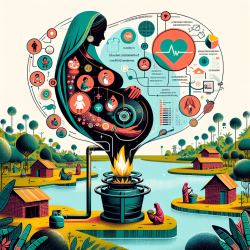The Impact of LPG Cookstoves on Perinatal Health: Lessons for Practitioners
As a speech-language pathologist deeply committed to improving child outcomes, it is essential to explore research beyond the immediate scope of our field. A recent study titled A Feasibility Study Assessing Acceptability and Supply Issues of Distributing LPG Cookstoves and Gas Cylinders to Pregnant Women Living in Rural Bangladesh for Poriborton: The CHANge Trial offers valuable insights that can indirectly influence our practice. This study, published in the International Journal of Environmental Research and Public Health, investigates the feasibility of distributing LPG cookstoves to pregnant women in rural Bangladesh to reduce household air pollution and improve perinatal health outcomes.
Key Findings and Their Implications
The study reveals several critical findings:
- Acceptability of LPG Cookstoves: The research found that LPG cookstoves were highly acceptable among the participants, with all users expressing a preference for continued use. This suggests that interventions promoting cleaner cooking technologies can be well-received, even in rural settings.
- Barriers to Distribution: The study identified significant barriers to the distribution of LPG cylinders, primarily due to the non-established supply chain in rural areas. Overcoming these logistical challenges is crucial for the successful implementation of similar interventions.
- Safety Concerns: Initial safety concerns were addressed through education and demonstrations, highlighting the importance of incorporating safety messaging in intervention programs.
- Seasonal Demand Variability: LPG demand varied by season, indicating the need for adaptive supply strategies to ensure consistent access.
These findings have broader implications for practitioners working to improve child outcomes. By understanding the environmental factors that influence perinatal health, we can better support families in creating healthier home environments. This, in turn, can lead to improved developmental outcomes for children.
Encouraging Further Research and Implementation
For practitioners looking to enhance their skills and knowledge, this study serves as a call to action. Consider the following steps:
- Explore Cross-Disciplinary Research: Delve into studies from fields such as environmental health to gain a holistic understanding of factors affecting child development.
- Advocate for Clean Cooking Solutions: Support initiatives that promote cleaner cooking technologies in communities, particularly in rural and underserved areas.
- Collaborate with Researchers: Partner with researchers to explore the intersection of environmental health and child development, contributing to a more comprehensive understanding of these issues.
By incorporating the insights from this study into our practice, we can contribute to a healthier start for children, ultimately leading to better outcomes in speech and language development.
To read the original research paper, please follow this link: A Feasibility Study Assessing Acceptability and Supply Issues of Distributing LPG Cookstoves and Gas Cylinders to Pregnant Women Living in Rural Bangladesh for Poriborton: The CHANge Trial.










